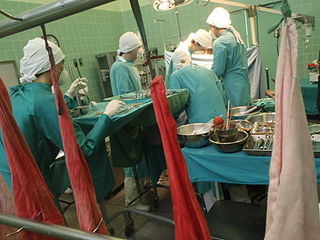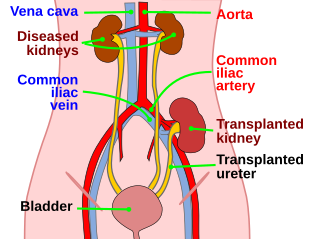Related Research Articles

Organ donation is the process when a person authorizes an organ of their own to be removed and transplanted to another person, legally, either by consent while the donor is alive, through a legal authorization for deceased donation made prior to death, or for deceased donations through the authorization by the legal next of kin.

Body Worlds is a traveling exposition of dissected human bodies, animals, and other anatomical structures of the body that have been preserved through the process of plastination. Gunther von Hagens developed the preservation process which "unite[s] subtle anatomy and modern polymer chemistry", in the late 1970s.

Organ transplantation is a medical procedure in which an organ is removed from one body and placed in the body of a recipient, to replace a damaged or missing organ. The donor and recipient may be at the same location, or organs may be transported from a donor site to another location. Organs and/or tissues that are transplanted within the same person's body are called autografts. Transplants that are recently performed between two subjects of the same species are called allografts. Allografts can either be from a living or cadaveric source.

Kidney transplant or renal transplant is the organ transplant of a kidney into a patient with end-stage kidney disease (ESRD). Kidney transplant is typically classified as deceased-donor or living-donor transplantation depending on the source of the donor organ. Living-donor kidney transplants are further characterized as genetically related (living-related) or non-related (living-unrelated) transplants, depending on whether a biological relationship exists between the donor and recipient. The first successful kidney transplant was performed in 1954 by a team including Joseph Murray, the recipient's surgeon, and Hartwell Harrison, surgeon for the donor. Murray was awarded a Nobel Prize in Physiology or Medicine in 1990 for this and other work. In 2018, an estimated 95,479 kidney transplants were performed worldwide, 36% of which came from living donors.

Body donation, anatomical donation, or body bequest is the donation of a whole body after death for research and education. There is usually no cost to donate a body to science; donation programs will often provide a stipend and/or cover the cost of cremation or burial once a donated cadaver has served its purpose and is returned to the family for interment.
Murder for body parts also known as medicine murder refers to the killing of a human being in order to excise body parts to use as medicine or purposes in witchcraft. Medicine murder is viewed as the obtaining of an item or items from a corpse to be used in traditional medicine. The practice occurs primarily in sub-equatorial Africa.
A tissue bank is an establishment that collects and recovers human cadaver tissue for the purposes of medical research, education and allograft transplantation. A tissue bank may also refer to a location where biomedical tissue is stored under cryogenic conditions and is generally used in a more clinical sense.
Organ trade is the trading of human organs, tissues, or other body products, usually for transplantation. According to the World Health Organization (WHO), organ trade is a commercial transplantation where there is a profit, or transplantations that occur outside of national medical systems. There is a global need or demand for healthy body parts for transplantation, which exceeds the numbers available.
Biomedical Tissue Services (BTS) was a Fort Lee, New Jersey, human tissue recovery firm that was shut down by the U.S. Food and Drug Administration (FDA) on October 8, 2005, after its president, Dr. Michael Mastromarino, and two other employees were convicted of illegally harvesting human bones, organs, tissue and other cadaver parts from individuals awaiting cremation, for forging numerous consent forms, and for selling the illegally obtained body parts to medical companies without consent of their families.
Henry Reid is the former director of UCLA’s willed body program, who agreed to a plea deal in October 2008 for admitting his role along with a body broker to profit from lease-loaning donated anatomical material to outside corporate research interests in 2004. In 2008 Reid pleaded guilty in exchange for a four years and four months prison sentenced for illegally profiting from the lease-loan of body parts that had been donated to UCLA's Willed Body Program. Reid was ordered by Los Angeles Superior Court Judge Curtis Rappe to pay $500,000 in restitution to the David Geffen School of Medicine.
Organ transplantation in Israel has historically been low compared to other Western countries due to a common belief that organ donation is prohibited under Jewish law. This changed with the passage of new organ donation laws in 2008. If two patients have the same medical need, priority will now go to the patient who has signed an organ donor card, or whose family members have donated an organ. This policy was nicknamed don't give, don't get. The law also defines "brain death" as an indication of death for all legal purposes, including organ donation. Additionally the law provides financial reimbursement to living donors for medical expenses due to donation and lost time at work. Organ trafficking is explicitly banned. Health insurance plans can no longer reimburse patients who go abroad to receive transplants.
A beating heart cadaver is a body that is pronounced dead in all medical and legal definitions, connected to a medical ventilator, and retains cardio-pulmonary functions. This keeps the organs of the body, including the heart, functioning and alive. As a result, the period of time in which the organs may be used for transplantation is extended. The heart contains pacemaker cells that will cause it to continue beating even when a patient is brain-dead. Other organs in the body do not have this capability and need the brain to be functioning to send signals to the organs to carry out their functions. A beating heart cadaver requires a ventilator to provide oxygen to its blood, but the heart will continue to beat on its own even in the absence of brain activity. This allows organs to be preserved for a longer period of time in the case of a transplant or donation. A small number of cases in recent years indicate that it can also be implemented for a brain-dead pregnant woman to reach the full term of her pregnancy. There is an advantage to beating heart cadaver organ donation because doctors are able to see the vitals of the organs and tell if they are stable and functioning before transplanting to an ailing patient.
Several authors have used the terms organ gifting and "tissue gifting" to describe processes behind organ and tissue transfers that are not captured by more traditional terms such as donation and transplantation. The concept of "gift of life" in the U.S. refers to the fact that "transplantable organs must be given willingly, unselfishly, and anonymously, and any money that is exchanged is to be perceived as solely for operational costs, but never for the organs themselves". "Organ gifting" is proposed to contrast with organ commodification. The maintenance of a spirit of altruism in this context has been interpreted by some as a mechanism through which the economic relations behind organ/tissue production, distribution, and consumption can be disguised. Organ/tissue gifting differs from commodification in the sense that anonymity and social trust are emphasized to reduce the offer and request of monetary compensation. It is reasoned that the implementation of the gift-giving analogy to organ transactions shows greater respect for the diseased body, honors the donor, and transforms the transaction into a morally acceptable and desirable act that is borne out of voluntarism and altruism.

The practice of selling one's kidney for profit in Iran is legal and regulated by the government. In any given year, it is estimated that 1400 Iranians sell one of their kidneys to a recipient who was previously unknown to them. Iran currently is the only country in the world that allows the sale of one's kidney for compensation ; consequently, the country does not have either a waiting list or a shortage of available organs.
Allegations of forced organ harvesting from Falun Gong practitioners and other political prisoners in China have raised concern within the international community. According to a report by former lawmaker David Kilgour, human rights lawyer David Matas and journalist Ethan Gutmann of the Victims of Communism Memorial Foundation, political prisoners, mainly Falun Gong practitioners, are being executed "on demand" in order to provide organs for transplant to recipients. Reports have said that organ harvesting has been used to advance the Chinese Communist Party's persecution of Falun Gong and because of the financial incentives available to the institutions and individuals involved in the trade. A report by The Washington Post has disputed some of the allegations, saying that China does not import sufficient quantities of immunosuppressant drugs, used by transplant recipients, to carry out such quantities of organ harvesting. However, a group of experts stated that the Post's article made an “elementary statistical error” and omitted unofficial pharmacy data in Chinese hospitals.
The Gerald Loeb Award for Explanatory is given annually for journalism pieces showing exemplary in-depth analysis and clear presentation of a complex business subject. First awarded in 2011, the "Explanatory" category was restricted to print, broadcast, and online works, then opened to all mediums in 2015. The first "Explanatory" award was given in 2011.
Human organ trafficking in Egypt, as of 2014 mainly practiced in Cairo and the Sinai Peninsula, includes organ harvesting with induced consent, coercion, and outright theft. Egypt has become the largest hub of organ transplant in North Africa as one of the few countries that prohibited organ donation from deceased donors until 2010, with over 500 kidney transplant operations a year and the majority of these organs come from living donors. Sources in the organ trafficking process mainly come from vulnerable populations including domestic rural migrants, undocumented asylum seekers and informal labor. The emergence of cultural and religious increase in organ trade and transplant tourism contribute to the rocketing demand for organ trafficking market in Egypt. Human organ trafficking poses both physical and mental health consequences for victims. Although Egypt has been gradually updating legal frameworks to combat organ trafficking, the regulation has failed in reality protecting survivors and governing transplant professionals.
Organ futures is the short term used in academic proposals for futures contracts on organs from human cadavers. They are not legal anywhere at this time.
Organ donation in India is regulated by the Transplantation of Human Organs and Tissues Act, 1994. The law allows both deceased and living donors to donate their organs. It also identifies brain death as a form of death. The National Organ and Tissue Transplant Organisation (NOTTO) functions as the apex body for activities of relating to procurement, allotment and distribution of organs in the country.
In June 2023, Cedric Lodge, his wife and three other individuals were indicted for conspiracy and interstate transport of stolen goods. Lodge, a morgue manager at Harvard Medical School, had access to bodies willed by their owners for academic research. While working at the school he allegedly sold human body parts on the internet.
References
- ↑ In the U.S. market for human bodies, almost anyone can dissect and sell the dead, Reuters, Brian Grow and John Shiffman, 25 October 2017
- ↑ Garment, Ann, et al. "Let the dead teach the living: the rise of body bequeathal in 20th-century America." Academic Medicine 82.10 (2007): 1000-1005.
- ↑ A Reuters journalist bought human body parts, then learned a donor's heart-wrenching story, Reuters, Brian Grow and John Shiffman, 25 October 2017
- ↑ How the body of an Arizona great-grandmother ended up as part of a U.S. Army blast test, Reuters, John Shiffman, 23 December 2016
- ↑ 2 Charged in UCLA Cadaver Scandal, Washington Post AP wire, Robert Jablon, 7 March 2007
- ↑ In Science's Name, Lucrative Trade in Body Parts, New York Times, Sandra Blakeslee, John M. Broder, Charlie Leduff, Andrew Pollack, 12 March 2004
- ↑ Human Body Parts Supplier Gets 10 Years, NBC LA
- ↑ Businessman found guilty in UCLA's willed body-parts program scandal, LA Times, Jack Leonard 15 May 2009
- ↑ Guilty plea in cadaver scheme at UCLA, LA Times, Victoria Kim, October 18, 2008